| Seite 11 |
|
Übung 1-1f. Demonstration Drills The worksheet "Demonstration Drills" will give you an idea of some
of the interactive exercises conducted during class sessions. Below is part B. Part A is on "Seite 1".
B
|
Übung 1-2e. Partnerarbeit: Abkürzungen Complete the worksheet "Abkürzungen". Part B is below. Part A is on "Seite 2".
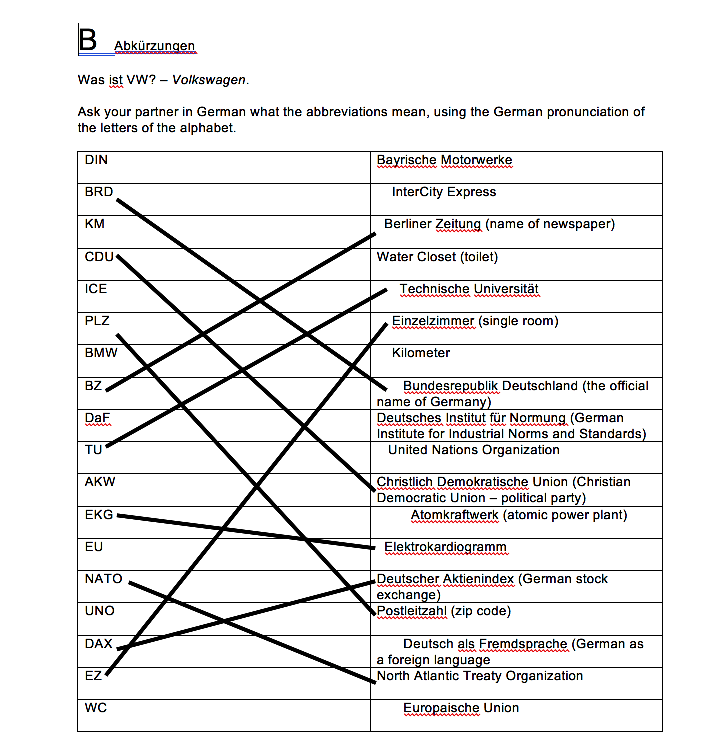
Übung 1-3g: Deutsche Postleitzahlen (German Postal Codes) Complete the designated worksheet with a partner in class. Below is part B. Part A is on "Seite 3".
B. Postleitzahlen
| 60311Frankfurt am Main | _________________ Köln |
| ________________ Dortmund | 07743 Jena |
| 54290 Trier | ______________ Bremen |
| ________________ Dresden | 20095 Hamburg |
- Wie ist eine Postleitzahl von Berlin?
- Eine Postleitzahl von Berlin ist 10115. Wie ist eine Postleitzahl von Wien?
Übung 1-3h: Wann wurden sie geboren? (When were they born?) Complete te designated worksheet with a partner in class. Part B is below. Part A is on "Seite 3".
B Wann wurden sie geboren? (When were they born?)
Wann wurde Albert Einstein geboren? Er wurde achtzehn hundert neunundsiebzig (1879) geboren.* Wann wurde Angela Merkel geboren? Sie wurde neunzehnhundert vierundfünfzig (1954) geboren.| Benjamin Franklin | |
| George Washington | 1732 |
| Abraham Lincoln | |
| Mark Twain | 1835 |
| Henry Ford | |
| Humphrey Bogart | 1899 |
| Billy Holliday | |
| Elvis Presley | 1935 |
| Marilyn Monroe | |
| John F. Kennedy | 1917 |
| Bob Dylan | |
| Martin Luther King, Jr. | 1929 |
| Bill Gates | |
| Johnny Depp | 1963 |
| Leo DiCaprio | |
| Taylor Swift | 1989 |
| Ich | |
| Mein(e) Partner(in)(Wann wurdest du geboren?) |
Übung 1-6e. Wohnort, Herkunft, Arbeitsplatz, Reiseziel. Worksheet "Über Wohnort / Herkunft / Arbeitsplatz und Reiseziel sprechen". Teil B (Part B) ist hier. Sie finden Teil A auf Seite 3. Ask how words are spelled IN GERMAN!: Wie schreibt man das?
B
Redemittel- Wo wohnt Frau Schulz? -- Sie wohnt in... Wo wohnst du? Ich wohne in...
- Woher kommen Carmen und Pedro? -- Sie kommen aus... Woher kommst du? Ich komme aus...
- Wo arbeitet Iris? -- Sie arbeitet bei... Wo arbeitest du? Ich arbeite bei...
- Wohin fliegt Herr Kruse? -- Er fliegt nach... Wohin fliegst du morgen? Ich fliege nach...
| Leute | Wo? | Woher? | Wo? | Wohin? |
|---|---|---|---|---|
| ...wohnt in... | ...kommt aus... | ...arbeitet bei... | ...fliegt nach... | |
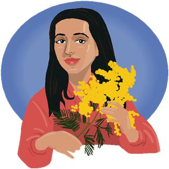 Frau Schultz |
Köln | Sachsen | ||

 Carmen und Pedro |
Bremen | Polen | ||
 Herr Kruse |
Brandenburg | Volkswagen | ||
 Iris |
Zeiss | Amerika | ||
| Sie | Frankfurt | Hessen | Bosch | Mexiko |
| Ihre Partnerin Ihr Partner |
Übung 1-7e. Um wieviel Uhr...? Partnerarbeit: "Uhrzeiten erfragen und nennen". Teil B. Teil A ist auf Seite 3.
 |
- Um wieviel Uhr steht Herr Fischer auf? Herr Fischer steht um halb sechs (um fünf Uhr dreißig) auf.
- Um wieviel Uhr isst Beate Frühstück? Beate isst Frühstück um viertel nach sieben (um sieben Uhr fünfzehn).
- Um wieviel Uhr hörst du Musik? Ich höre Musik um neun Uhr zwanzig.
| Herr Fischer | Beate | Sie | Ihre Partnerin / Ihr Partner | |
|---|---|---|---|---|
| aufstehen |  |
 |
 |
 |
| Frühstück essen |  |
 |
 |
 |
| Musik hören |  |
 |
 |
 |
| zur Klasse (an die Arbeit) gehen |  |
 |
 |
 |
| zu Mittag essen |  |
 |
 |
 |
| zu Abend essen |  |
 |
 |
 |
| ins Bett gehen |  |
 |
 |
 |
Sie berichten dann wer was um wieviel Uhr macht: Ich stehe um acht Uhr auf. Meine Partnerin isst zu Mittag um ein Uhr. Herr Fischer geht um elf Uhr zwanzig ins Bett. Beate geht um zehn Uhr zur Klasse.
Übung 1-8b. Wochenplan: Uni und Freizeit Teil B (Teil A is auf Seite 8.) Work with a partner and ask for the missing information.
Redemittel:
- "Wann macht Lena Yoga?" → Lena macht Yoga am Montag um zehn Uhr fünfundvierzig.
- "Wann spielen Greta und Jakob Karten?" → Sie spielen Karten am Freitag um neunzehn Uhr zehn.
- "Wann hat Klaus Chemie?" → Klaus hat Chemie am Mittwoch um dreizehn Uhr fünfundfünfzig.
- "Wann haben Tania und Harald Philosphie?" → Sie haben Philosophie am Donnerstag um zwölf Uhr fünfzehn.
Yoga machen, Golf spielen, Computerspiele spielen, Karten spielen, Fußball spielen, Tischtennis spielen, Volleyball spielen, E-mails schreiben, Schach (chess) spielen, joggen gehen, Basketball spielen, Gewichte heben (lift weights), Tennis spielen, ins Kino gehen, ins Restaurant gehen.
| Montag | Dienstag | Mittwoch | Donnerstag | Freitag | Samstag | Sonntag |
|---|---|---|---|---|---|---|
 Boris |
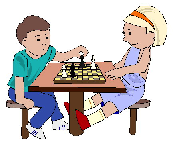 Peter und Lisa 16.00 |
 Klaus |
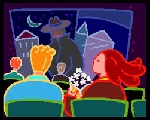 Heike und Richard 19.15 |
 Melanie |
 David 8.15 |
 Sonja |
 Dieter und Rosa 18.10 |
 Siegfried |
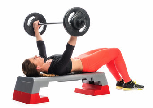 Lena 9.40 |
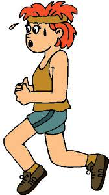 Beate |
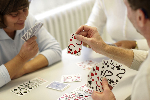 Grete und Jakob 19.35 |
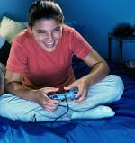 Norbert |
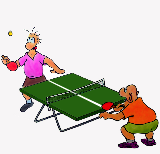 Georg und Robert 11.15 |
| Physik (Boris) | Deutsch (Melanie) 10.00 | Chemie (Lena) | Englisch (Sonja) 14.45 |
Biologie (Norbert) | Mathe (Dieter und Rosa) 15.55 | Philosophie (Siegfried) |
Übung 1-8c. Sich Verabreden Teil B. (Teil A ist auf Seite 8.) Sie gehen ins Kino. Wann haben Sie und Ihre Partneris / Ihr Partner Zeit? Hier ist ihr Terminkalendar. Um wieviel Uhr? Notieren Sie alle Informationen!
Redemittel:
- Hast du am Montag um 14.00 (vierzehn Uhr) Zeit? Nein, dann (then) habe ich keine Zeit. Ich gehe zur Balletgruppe.
- (Ja. Dann habe ich Zeit.)
| Montag | Dienstag | Mittwoch | Donnerstag | Freitag | Samstag | Sonntag | |
|---|---|---|---|---|---|---|---|
| 14.00-16.00 | mit meiner Studiengruppe treffen (meet) | meine Tante besuchen | einen Ausflug (trip) mit meiner Familie machen | ||||
| 16.00-18.00 | ins Theater gehen | zur Musikstunde gehen | im Restaurant arbeiten | mit meiner Studiengruppe treffen | meine Tante besuchen | einen Ausflug mit meiner Familie machen | |
| 18.00-20.00 | im Fitness-Center Gewichte heben | ins Rock-Konzert gehen | einen Ausflug mit meiner Familie machen | ||||
| 20.00-22.00 | zur Yoga-Gruppe gehen | mit Freunden Karten spielen | einen Film im Fernsehen sehen | ins Rock-Konzert gehen | einen Ausflug mit meiner Familie machen |
Wiederholung
TippOn-line German CoursesThere are countless on-line language-learning sites. Here are two that are especially popular for German: |
Kapitel 1 KlausurSkills include reading, writing, speaking, and listening.You will demonstrate that you can do the following in German:
|
- Textbook Introduction
- Kapitel 1: Seite 1 (page 1)
- Kapitel 1: Seite 2 (page 2)
- Kapitel 1: Seite 3
- Kapitel 1: Seite 4
- Kapitel 1: Seite 5
- Kapitel 1: Seite 6
- Kapitel 1: Seite 7
- Kapitel 1: Seite 8
- Kapitel 1: Seite 9
- Kapitel 1: Seite 10
- Kapitel 1: Seite 11